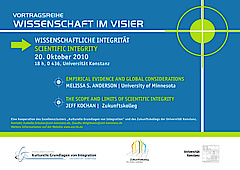Scientific Integrity
20. October 2010
Empirical Evidence and Global Considerations
Prof. Melissa Susan Anderson (Minnesota)
The integrity of the scientific record is a fundamental concern of all researchers and research institutions. Empirical evidence based on a national study in the U.S. suggests, however, that certain features of the research environment are associated with counter-normative perspectives on science as well as behaviors that compromise the integrity of research. Responses to such challenges often take the form of reactions to individual cases of misconduct, but a more proactive and instructive approach is needed. International research collaborations indicate additional concerns related to scientific integrity that must be addressed on a global scale.
The Scope and Limits of Scientific Integrity
Dr. Jeff Kochan (Konstanz/Zukunftskolleg)
An emphasis on integrity relations in science brings with it specific commitments about what science is, and what it should be. Indeed too strong a focus on scientific integrity may distract us from another important, perhaps essential, element in scientific organization: what I shall call intimacy relations. It seems very difficult to determine how we might balance integrity and intimacy relations in a way which serves both scientific progress and the public interest. I illustrate this problem with an example: the debate over who was responsible for the 1986 explosion of the space shuttle Challenger.
20 October 2010, 6 pm
University of Konstanz, Room D 436
part of the lecture series "Wissenschaft im Visier", organized by the Center of Excellence „Cultural Foundations of Integration“ and the Zukunftskolleg of the University of Konstanz
